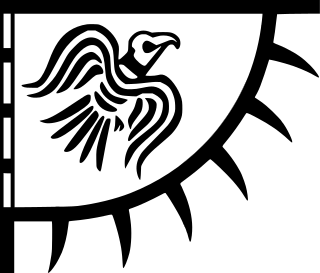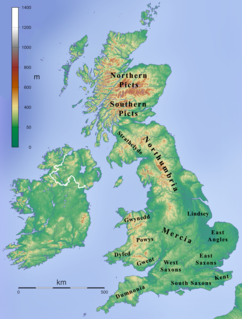
Wessex was an Anglo-Saxon kingdom in the south of Great Britain, from 519 until England was unified by Æthelstan in 927.

Mercia was one of the kingdoms of the Anglo-Saxon Heptarchy. The name is a Latinisation of the Old English Mierce or Myrce, meaning "border people". Mercia dominated what would later become England for three centuries, subsequently going into a gradual decline while Wessex eventually conquered and united all the kingdoms into the Kingdom of England.

Æthelflæd, Lady of the Mercians ruled Mercia in the English Midlands from 911 until her death. She was the eldest daughter of Alfred the Great, king of the Anglo-Saxon kingdom of Wessex, and his wife Ealhswith.

The Danelaw was the part of England in which the laws of the Danes held sway and dominated those of the Anglo-Saxons. The Danelaw contrasts with the West Saxon law and the Mercian law. The term is first recorded in the early 11th century as Dena lage. The areas that constituted the Danelaw lie in northern and eastern England, long occupied by Danes and other Norsemen.

Æthelbald was the King of Mercia, in what is now the English Midlands from 716 until he was killed in 757. Æthelbald was the son of Alweo and thus a grandson of King Eowa. Æthelbald came to the throne after the death of his cousin, King Ceolred, who had driven him into exile. During his long reign, Mercia became the dominant kingdom of the Anglo-Saxons, and recovered the position of pre-eminence it had enjoyed during the strong reigns of Mercian kings Penda and Wulfhere between about 628 and 675.

Æthelred was king of Mercia from 675 until 704. He was the son of Penda of Mercia and came to the throne in 675, when his brother, Wulfhere of Mercia, died from an illness. Within a year of his accession he invaded Kent, where his armies destroyed the city of Rochester. In 679 he defeated his brother-in-law, Ecgfrith of Northumbria, at the Battle of the Trent: the battle was a major setback for the Northumbrians, and effectively ended their military involvement in English affairs south of the Humber. It also permanently returned the kingdom of Lindsey to Mercia's possession. However, Æthelred was unable to re-establish his predecessors' domination of southern Britain.

Wulfhere or Wulfar was King of Mercia from 658 until 675 AD. He was the first Christian king of all of Mercia, though it is not known when or how he converted from Anglo-Saxon paganism. His accession marked the end of Oswiu of Northumbria's overlordship of southern England, and Wulfhere extended his influence over much of that region. His campaigns against the West Saxons led to Mercian control of much of the Thames valley. He conquered the Isle of Wight and the Meon valley and gave them to King Æthelwealh of the South Saxons. He also had influence in Surrey, Essex, and Kent. He married Eormenhild, the daughter of King Eorcenberht of Kent.

Penda was a 7th-century King of Mercia, the Anglo-Saxon kingdom in what is today the English Midlands. A pagan at a time when Christianity was taking hold in many of the Anglo-Saxon kingdoms, Penda took over the Severn Valley in 628 following the Battle of Cirencester before participating in the defeat of the powerful Northumbrian king Edwin at the Battle of Hatfield Chase in 633.
Æthelred, Lord of the Mercians became ruler of English Mercia shortly after the death of its last king, Ceolwulf II in 879. His rule was confined to the western half, as eastern Mercia was then part of the Viking-ruled Danelaw. Æthelred's ancestry is unknown. He was probably the leader of an unsuccessful Mercian invasion of Wales in 881, and soon afterwards he acknowledged the lordship of King Alfred the Great of Wessex. This alliance was cemented by the marriage of Æthelred to Alfred's daughter Æthelflæd.

Coenred was king of Mercia from 704 to 709. Mercia was an Anglo-Saxon kingdom in the English Midlands. He was a son of the Mercian king Wulfhere, whose brother Æthelred succeeded to the throne in 675 on Wulfhere's death. In 704, Æthelred abdicated in favour of Coenred to become a monk.

Ceolred was King of Mercia from 709 to 716.

Wiglaf was King of Mercia from 827 to 829 and again from 830 until his death. His ancestry is uncertain: the 820s were a period of dynastic conflict within Mercia and the genealogy of several of the kings of this time is unknown. Wigstan, his grandson, was later recorded as a descendant of Penda of Mercia, so it is possible that Wiglaf was descended from Penda, one of the most powerful seventh-century kings of Mercia.
Osthryth, queen of the Mercians, was the wife of King Æthelred and daughter of King Oswiu of Northumbria and his second wife Eanflæd. She probably married Æthelred before 679 and was murdered by the nobles of Mercia.

Ceolwulf II was the last king of independent Mercia. He succeeded Burgred of Mercia who was deposed by the Vikings in 874. His reign is generally dated 874 to 879 based on a Mercian regnal list which gives him a reign of five years. However, D. P. Kirby argues that he probably reigned into the early 880s. By 883, he was replaced by Æthelred, Lord of the Mercians, who became ruler of Mercia with the support of Alfred the Great, king of Wessex.
Mercian was a dialect spoken in the Anglian kingdom of Mercia. Together with Northumbrian, it was one of the two Anglian dialects. The other two dialects of Old English were Kentish and West Saxon. Each of those dialects was associated with an independent kingdom on the island. Of these, all of Northumbria and most of Mercia were overrun by the Vikings during the 9th century. Part of Mercia and all of Kent were successfully defended but were then integrated into the Kingdom of Wessex. Because of the centralisation of power and the Viking invasions, there is little to no salvaged written evidence for the development of non-Wessex dialects after Alfred the Great's unification, until the Middle English period.

The Five Boroughs or The Five Boroughs of the Danelaw were the five main towns of Danish Mercia. These were Derby, Leicester, Lincoln, Nottingham and Stamford. The first four later became county towns.

Edward the Elder was King of the Anglo-Saxons from 899 until his death. He was the elder son of Alfred the Great and his wife Ealhswith. When Edward succeeded to the throne, he had to defeat a challenge from his cousin Æthelwold, who had a strong claim to the throne as the son of Alfred's elder brother and predecessor, Æthelred.

The Kingdom of the East Angles, today known as the Kingdom of East Anglia, was a small independent kingdom of the Angles comprising what are now the English counties of Norfolk and Suffolk and perhaps the eastern part of the Fens. The kingdom formed in the 6th century in the wake of the Anglo-Saxon settlement of Britain. It was ruled by the Wuffingas dynasty in the 7th and 8th centuries, but fell to Mercia in 794, and was conquered by the Danes in 869, to form part of the Danelaw. It was conquered by Edward the Elder and incorporated into the Kingdom of England in 918.
Urbs Iudeu was a city besieged in 655 AD by Penda, King of Mercia, and Cadafael, King of Gwynedd. The siege was an important episode in a long-running war between Mercia and Northumbria in the years 616–679. This war was fought in the area north of the River Trent, in particular in and around the Peak District (Wirksworth) also around Heathfield (Doncaster), Elmet (Aberford) and Lindsey (Lincoln), as these were provinces of Northumbria at the time.














